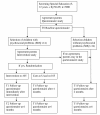The effectiveness of Stepping Stones Triple P: the design of a randomised controlled trial on a parenting programme regarding children with mild intellectual disability and psychosocial problems versus care as usual
- PMID: 21878093
- PMCID: PMC3170625
- DOI: 10.1186/1471-2458-11-676
The effectiveness of Stepping Stones Triple P: the design of a randomised controlled trial on a parenting programme regarding children with mild intellectual disability and psychosocial problems versus care as usual
Abstract
Background: Children with an intellectual disability are at increased risk of psychosocial problems. This leads to serious restrictions in the daily functioning of the children and to parental stress. Stepping Stones Triple P aims to prevent severe behavioural, emotional and developmental problems in children with a (intellectual) disability by enhancing parenting knowledge and skills, and the self-confidence of parents. This paper aims to describe the design of a study of the effectiveness of parenting counselling using Stepping Stones Triple P compared to Care as Usual.
Methods/design: The effects of Stepping Stones Triple P will be studied in a Randomised Controlled Trial. Parents of children aged 5-12 years with an IQ of 50-85 will be recruited from schools. Prior to randomisation, parents complete a screening questionnaire about their child's psychosocial problems and their parenting skills. Subsequently, parents of children with increased levels of psychosocial problems (score on Strengths and Difficulties Questionnaire ≥ 14) will be invited to participate in the intervention study. After obtaining consent, parents will be randomised either to the experimental group (Stepping Stones Triple P) or to Care as Usual. The primary outcome is a change in the child's psychosocial problems according to parents and teachers. The secondary outcome is a change in parenting skills. Data will be collected before the start of the intervention, immediately after the intervention, and six months after.
Discussion: This paper presents an outline of the background and design of a randomised controlled trial to investigate the effectiveness of Stepping Stones Triple P, which aims to decrease psychosocial problems in children with a mild intellectual disability. Stepping Stones Triple P seems promising, but evidence on its effectiveness for this population is still lacking. This study provides evidence about the effects of this intervention in a community-based population of children with a mild intellectual disability.
Trial registration: Netherlands Trial Register (NTR): NTR2624.
Figures
Similar articles
-
The effectiveness of Stepping Stones Triple P parenting support in parents of children with borderline to mild intellectual disability and psychosocial problems: a randomized controlled trial.BMC Med. 2014 Oct 28;12:191. doi: 10.1186/s12916-014-0191-5. BMC Med. 2014. PMID: 25348259 Free PMC article. Clinical Trial.
-
Clinical and cost-effectiveness of an adapted intervention for preschoolers with moderate to severe intellectual disabilities displaying behaviours that challenge: the EPICC-ID RCT.Health Technol Assess. 2024 Jan;28(6):1-94. doi: 10.3310/JKTY6144. Health Technol Assess. 2024. PMID: 38329108 Free PMC article. Clinical Trial.
-
Effectiveness of a parenting programme in a public health setting: a randomised controlled trial of the positive parenting programme (Triple P) level 3 versus care as usual provided by the preventive child healthcare (PCH).BMC Public Health. 2010 Mar 15;10:131. doi: 10.1186/1471-2458-10-131. BMC Public Health. 2010. PMID: 20230604 Free PMC article. Clinical Trial.
-
Systematic Review and Meta-analysis of Stepping Stones Triple P for Parents of Children with Disabilities.Fam Process. 2019 Mar;58(1):232-246. doi: 10.1111/famp.12352. Epub 2018 Mar 9. Fam Process. 2019. PMID: 29520764
-
Triple P-Positive Parenting Program: towards an empirically validated multilevel parenting and family support strategy for the prevention of behavior and emotional problems in children.Clin Child Fam Psychol Rev. 1999 Jun;2(2):71-90. doi: 10.1023/a:1021843613840. Clin Child Fam Psychol Rev. 1999. PMID: 11225933 Review.
Cited by
-
Stepping Stones Triple P: the importance of putting the findings into context--a response to Tellegen and Sofronoff.BMC Med. 2015 Feb 19;13:36. doi: 10.1186/s12916-015-0289-4. BMC Med. 2015. PMID: 25877781 Free PMC article.
-
The effectiveness of Stepping Stones Triple P parenting support in parents of children with borderline to mild intellectual disability and psychosocial problems: a randomized controlled trial.BMC Med. 2014 Oct 28;12:191. doi: 10.1186/s12916-014-0191-5. BMC Med. 2014. PMID: 25348259 Free PMC article. Clinical Trial.
-
Caregivers' Burden of School-Aged Children with Neurodevelopmental Disorders: Implications for Family-Centred Care.Brain Sci. 2021 Jun 30;11(7):875. doi: 10.3390/brainsci11070875. Brain Sci. 2021. PMID: 34208983 Free PMC article.
References
-
- Kaptein S, Jansen DE, Vogels AG, Reijneveld SA. Mental health problems in children with intellectual disability: use of the Strengths and Difficulties Questionnaire. J Intellect Disabil Res. 2008;52(Pt 2):125–131. - PubMed
Publication types
MeSH terms
LinkOut - more resources
Full Text Sources
Medical


